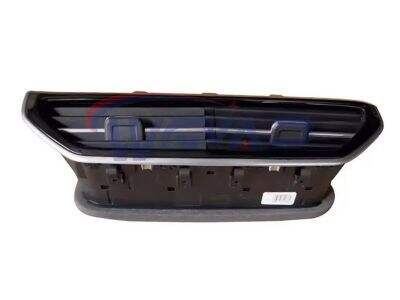ကားချိုင်စီနည်းပညာများသည် ဆီစွမ်းအင်ထိရောက်မှုအတွက် အရေးပါသော အချက်တစ်ခုလည်းဖြစ်ပါသည်။ ဆီအသုံးပြုမှုနှင့် ၎င်း၏ ထိရောက်မှုသည် ချိုင်စီနှင့် အစိတ်အပိုင်းများ၏ ဒီဇိုင်းပေါ်တွင် အဓိကမူတည်ပါသည်။ ကားချိုင်စီစနစ်များက ဆီအသုံးပြုမှုကို မည်သို့သက်ရောက်မှုရှိပြီး ထိုစနစ်များကို မည်သို့မွမ်းမံအဆင့်မြှင့်၍ စွမ်းဆောင်ရည်ကို တိုးတက်စေနိုင်သည်ကို နားလည်ခြင်းသည် ယာဉ်မောင်းများအနေဖြင့် ဂါစ်ငွေကုန်ကျစရိတ်နှင့် အမှိုက်သိုက်မှုကို လမ်းများပေါ်တွင် လျှော့ချနိုင်စေပါသည်။
ကားချိုင်စီစနစ်များ၏ ဆီစွမ်းအင်ထိရောက်မှုအပေါ် သက်ရောက်မှု
ကား၏ ချိုင်စီသည် ၎င်း၏ အရိုးကြီးဟု ဆိုနိုင်ပြီး အရာအားလုံးကို နေရာတကျတည်ရှိစေကာ လွှဲပြောင်းသော ဝန်ကို ထောက်ပံ့ပေးပါသည်။ ချိုင်စီ၏ အလေးချိန်နှင့် လေပိုင်းဒီဇိုင်းတို့သည် မည်မျှပမာဏကို ရောင်းနှုန်း ယာဉ်ကို မောင်းနှင်ရန် လိုအပ်ပါသည်။ ပိုလေးသောချက်စီသည် မောင်းနှင်ရန် ပိုမိုသောစွမ်းအင်ကို လိုအပ်ပြီး ဆီဆိုးကုန်ကျမှုကို ပိုမိုများပြားစေပါသည်။ ထို့အပြင် ကိုယ်ထည်နှင့် ချက်စီဒီဇိုင်းသည် ယာဉ်ပတ်လည်ရှိ လေစီးကြောင်းကို သက်ရောက်မှုရှိပြီး ယာဉ်၏ စုစုပေါင်းအေရိုဒိုင်းနမိတ်ကို သက်ရောက်မှုရှိပါသည်။ ချောမွေ့ပြီး အေရိုဒိုင်းနမိတ်ကျသော ကိုယ်ထည်သည် လေဒဏ်ခံရမှုကို လျော့ကျစေပြီး ယာဉ်၏ လေကိုဖြတ်သန်းနိုင်စွမ်းကို မြှင့်တင်ကာ ဆီဆိုးစွမ်းဆောင်ရည်ကို ပိုမိုကောင်းမွန်စေပါသည်။
ယာဉ်၏ ချက်စီဆပ်ရှင်းစနစ်သည်လည်း ဆီဆိုးကုန်ကျမှုကို သက်ရောက်မှုရှိပါသည်
ကောင်းမွန်စွာ ချိန်ညှိထားသော ဆပ်ရှင်းစနစ်သည် လမ်းပေါ်တွင် တုန်ခါခြင်း၊ ထိခိုက်ခြင်းများကြောင့် စွမ်းအင်ဆုံးရှုံးမှုကို လျော့နည်းစေပြီး ပိုမိုထိရောက်စွာ ရွေ့လျားနိုင်စေပါသည်။ ဆိုးရွားသော ဆပ်ရှင်းစနစ်သည် စွမ်းအင်ဆုံးရှုံးမှုကို ပြန်လည်ရရှိရန် အင်ဂျင်ကို ပိုမိုအလုပ်လုပ်စေပြီး ဆီဆိုးပိုမိုကုန်ကျစေပါသည်။
ချက်စီစနစ် အဆင့်မြှင့်တင်ခြင်းဖြင့် ဆီဆိုးစွမ်းဆောင်ရည်ကို မြှင့်တင်ခြင်း
ပိုမိုကောင်းမွန်အောင် ပြုလုပ်ရန် နည်းလမ်းတစ်ခုမှာ နောက်ဘမ်းပါး ကားရဲ့ အလေးချိန်ကို လျှော့ချဖို့ ကားရဲ့ ဘီးကို ပြောင်းလဲဖို့ လိုပါတယ်။ အလေးချိန်လျှော့ချခြင်းနှင့် လောင်စာစရိတ်တိုးမြှင့်ခြင်းအတွက် အလူမီနီယံ သို့မဟုတ် ကာဗွန်အမျှင်ကဲ့သို့ လွယ်ကူသော ပစ္စည်းများဖြင့် တည်ဆောက်နိုင်သည်။ ဒါ့အပြင် ကားကိုယ်ထည်ရဲ့ ဒီဇိုင်းအရ လောင်စာထုတ်လွှတ်မှု လျှော့ချဖို့ ပိုများတဲ့ မှတ်ပုံတင်တွေ ထည့်သွင်းပေးမယ့် အဆင့်အထိပါ။ အဲဒါဟာ အတောင်ပံတွေ၊ diffusers တွေ ဒါမှမဟုတ် ကားပတ်ဝန်းကျင်က လေစီးဆင်းမှုကို ထိန်းချုပ်ဖို့ ကူညီပေးကြတဲ့ အပြင်ဘက်မှာ ချောမွေ့တဲ့ အပိုင်းတွေကို ထည့်သွင်းပေးရန် လိုအပ်နိုင်ပါတယ်။
မြှင့်တင်ထားသော ချိတ်ဆက်မှုသည်လည်း လောင်စာကို ကောင်းမွန်စွာ သုံးစွဲရန် ကူညီပေးနိုင်သည်။
နောက်တစ်နည်းက ကားပေါ်တွင် အားကောင်းသော အုတ်ချပ်များနှင့် ဆုံတံများ တပ်ဆင်ခြင်းဖြင့် လမ်းပေါ်တွင် ပြတ်သားမှုရှိသောအခါ စွမ်းအင် ဆုံးရှုံးမှုကို တားဆီးနိုင်ကာ ပိုမိုကောင်းမွန်သော ချုပ်ကိုင်မှုနှင့် တည်ငြိမ်မှုကို ရရှိစေရန် ဖြစ်သည်။ ထို့အပြင် adaptive suspension system ကဲ့သို့သော နည်းပညာများကို အသုံးပြုခြင်းသည် လမ်းနှင့် ယာဉ်မောင်း input ကား chassis အစိတ်အပိုင်းစနစ်များ၏ အခြေအနေများအပေါ် အခြေခံ၍ ဘော်ဒါကွန်ပျူတာအလိုက် အပြောင်းအလဲရှိသည့် damping rate များဖြင့် လောင်စာသက်သာမှုကို တိုးမြှင့်နိုင်ပြီး hot hatch များတွင် တိုးမြှင့်ပေး အလေးချိန်၊ လေအားနဲ့ ချိတ်ဆက်မှုပုံစံကို သတ်မှတ်ခြင်းဖြင့် ကားမောင်းသူတွေဟာ ပိုကောင်းမွန်စွာ မောင်းနှင်နိုင်ဖို့နဲ့ လောင်စာ ချွေတာနိုင်ဖို့ ကားရဲ့ အကောင်းဆုံး ထိရောက်မှုအတွက် ပညာရှိဆုံးဖြတ်ချက်တွေ ချမှတ်နိုင်ပါတယ်။
ကားချပ်အင်ဂျင်ကို အပြည့်အဝ သုံးနေသလား
သင့်ကားရဲ့ ကားချပ်စနစ်ဟာ သင့်ကားရဲ့ လောင်စာစီးပွားရေးအတွက် အရေးကြီးတဲ့ အစိတ်အပိုင်းပါ။ ဒီဖွဲ့စည်းမှုက အခြေခံအားဖြင့် ကားရဲ့ အရိုးစုဖြစ်ပြီး အခြားအစိတ်အပိုင်းအားလုံးကို ထောက်ပံ့ပြီး ချိတ်ဆက်ဖို့ အရိုးလို ဘောင်တစ်ခု တကယ်ပဲ ပေးပါတယ်။ ထို့အပြင် မှန်ကန်စွာ ဒီဇိုင်းထုတ်ထားသော ချာစီစနစ်သည် ယာဉ်၏ အလေးချိန် လျှော့ချမှုသို့ ပါဝင်နိုင်ပြီး ပိုမိုကောင်းမွန်သော လောင်စာသုံးစွဲမှုသို့ ဦးတည်စေသည်။ အဲဒါဟာ လေထုဆိုင်ရာ အားနည်းချက် ဖြစ်နိုင်ပါတယ်။ ကားရဲ့ အောက်ခြေမှာ ဆန့်ကျင်မှုနည်းတဲ့ ကားခန္ဓာကိုယ် တည်ဆောက်မှုက ကားကို လမ်းပေါ်ကို ရွေ့ရှားဖို့ လိုအပ်တဲ့ စွမ်းအင်ပမာဏကိုလည်း လျှော့ချပေးပါတယ်။ ဒါက ပိုကောင်းမွန်တဲ့ ရှေ့နှင့်နောက်ဘမ်းပါး အထူးသဖြင့် အမြန်နှုန်းမြင့်တဲ့အခါမှာပေါ့။ ဒီကိစ္စမှာ ရပ်ဆိုင်းမှု ပုံစံဟာ နောက်ထပ် စဉ်းစားစရာပါ။ မော်တော်ယာဉ်ကို မောင်းနှင်ရန် လိုအပ်သော အချက်များ ဒါက ပိုမိုနှစ်လိုဖွယ်ရာ ကားမောင်းမှုနဲ့ ပိုကောင်းတဲ့ လောင်စာသုံးစွဲမှုဆိုလိုတာပါ။
လက်ကားဝယ်သူများသည် ၎င်းတို့၏ ချေးစီစနစ်ကို ထိန်းသိမ်းခြင်းဖြင့် ငွေသက်သာစေနိုင်သည်
ချေးစီစနစ်ကို မှန်ကန်စွာ ဂရုစိုက်ခြင်းက သင်ဟာ တစ်ဂယ်လိုနာကို မိုင်အများဆုံး ရယူနိုင်ပြီး နည်းတစ်ခုထက် ပိုပြီး ချွေတာနိုင်တာကို အာမခံပေးပါတယ်။ ဒါက အိတ်အတွင်းမှာ တန်ဖိုးကြီးပြီး ပြင်ဆင်ဖို့ စျေးကြီးတဲ့ ခြေရာတွေနဲ့ ပတ်သက်တဲ့ သိသာတဲ့ ပြဿနာတွေကို သက်သာစေနိုင်ပါတယ်။ [စာမျက်နှာ ၂၇ ပါ ရုပ်ပုံ] အာရုံစိုက်ဖို့ အရေးကြီးဆုံး အပိုင်းတစ်ခုက ဘီးတွေရဲ့ ညှိနှိုင်းမှုပါ။ ဘီးတွေ မညီမျှရင် ဘီးတွေ မညီမျှစွာ စွဲသွားနိုင်ပြီး သုံးဖို့ ပိုကုန်ကျတဲ့ ဓာတ်ငွေ့ဖိအားကို ခံစားရနိုင်တယ်။ လက်ကားရောင်းသူတွေဟာ သူတို့ရဲ့ ဝယ်သူတွေကို သူတို့ရဲ့ ဘီးတွေ တစ်ပြိုင်နက် အလုပ်လုပ်တာ သေချာအောင်လုပ်ရင်း မိုင်ရေရှည် တိုးတက်အောင် ကူညီနိုင်ပါတယ်။
အဝတ်ပျက်နေတဲ့ အစိတ်အပိုင်းတွေကို ပုံမှန်စစ်ဆေးပြီး အစားထိုးပေးခြင်းက လောင်စာကို ပိုထိရောက်စွာ သုံးနိုင်ပါတယ် ကားမောင်းနေစဉ်မှာ အပင်ပန်းနေတဲ့ ချိတ်ဆက်မှုက ကားကို ပိုတက်တက်နိုင်အောင် လုပ်ပေးပြီး လောင်စာ သုံးစွဲမှုကို လျှော့ချပေးမှာပါ။ သူတို့ရဲ့ ယာဉ်တွေမှာ အစိတ်အပိုင်းသစ်တွေ ထည့်ပေးခြင်းက လက်ကားဝယ်သူတွေကို သူတို့ရဲ့ စက်ပစ္စည်းတွေကို ကောင်းမွန်စွာ လည်ပတ်စေဖို့ အခွင့်ပေးမှာပါ။
အစုရှယ်ယာဝယ်ယူသူများက လောင်စာသက်သာစေရန်အတွက် chassis စနစ်များ ဝယ်ယူရာတွင် စဉ်းစားသင့်သည့် အချက်များ
သင်ဟာ လက်ကားဝယ်ယူနေပြီး ပိုကောင်းတဲ့ လောင်စာသုံးစွဲမှုအတွက် ချေးစီစနစ်ကို ရွေးဖို့လိုတယ်ဆိုရင် ဆုံးဖြတ်ချက်ချတဲ့ အကြောင်းရင်း အနည်းငယ်ကို အာရုံစိုက်ဖို့ သေချာအောင်လုပ်ပါ။ ပထမက ချေးစီအလေးချိန်က အရေးပါပါတယ်။ ပိုမိုလျှော့ချသော ချေးစီသည် ကား၏ အလေးချိန်ကို လျှော့ချပေးသောကြောင့် ဓာတ်ဆီ မိုင်ရေတိုးလာစေနိုင်သည်။ ဒါ့အပြင် chassis ရဲ့ဒီဇိုင်းကလည်း လောင်စာသုံးစွဲမှုကို သိသိသာသာ သက်ရောက်စေနိုင်ပါတယ်။ လက်လီဆိုင်တွေက လေတိုက်တိုက်မှုကို လျှော့ချဖို့နဲ့ အပြင်လေထဲမှာ အအေးခံနိုင်စွမ်းကို တိုးမြှင့်ဖို့ လေယာဉ်မောင်းစနစ်ကို လေကြောင်းနဲ့ ညှိပေးချင်ကြမှာပါ။
နောက်ဆုံးအနေနဲ့ သင့်မှာရှိတဲ့ ချိတ်ဆက်မှုစနစ်ရဲ့ အမျိုးအစားဟာ လောင်စာကို ကောင်းမွန်စွာ သုံးနိုင်ဖို့လည်း အရေးကြီးပါတယ်။ လက်ကားဝယ်ယူသူများသည် လမ်းပေါ်မှ ထိတ်လန့်မှုနှင့် တုန်ခါမှုကို လျော့နည်းစေနိုင်သော ကောင်းမွန်စွာ စဉ်းစားထားသော ချိတ်ဆက်ထားသော ချေးစီစနစ်များကို ရွေးချယ်သင့်သည်။ ဒါတွေကို ထည့်သွင်းစဉ်းစားခြင်းက လက်ကားဝယ်သူတွေကို သူတို့ရဲ့ယာဉ်တွေမှာ ဘယ်ကားချပ်စနစ်တွေ တပ်ဆင်မလဲဆိုတာ ဆုံးဖြတ်ဖို့ ကူညီပေးမှာပါ။
အကြောင်းအရာများ
- ကားချိုင်စီစနစ်များ၏ ဆီစွမ်းအင်ထိရောက်မှုအပေါ် သက်ရောက်မှု
- ယာဉ်၏ ချက်စီဆပ်ရှင်းစနစ်သည်လည်း ဆီဆိုးကုန်ကျမှုကို သက်ရောက်မှုရှိပါသည်
- ချက်စီစနစ် အဆင့်မြှင့်တင်ခြင်းဖြင့် ဆီဆိုးစွမ်းဆောင်ရည်ကို မြှင့်တင်ခြင်း
- မြှင့်တင်ထားသော ချိတ်ဆက်မှုသည်လည်း လောင်စာကို ကောင်းမွန်စွာ သုံးစွဲရန် ကူညီပေးနိုင်သည်။
- ကားချပ်အင်ဂျင်ကို အပြည့်အဝ သုံးနေသလား
- လက်ကားဝယ်သူများသည် ၎င်းတို့၏ ချေးစီစနစ်ကို ထိန်းသိမ်းခြင်းဖြင့် ငွေသက်သာစေနိုင်သည်
- အစုရှယ်ယာဝယ်ယူသူများက လောင်စာသက်သာစေရန်အတွက် chassis စနစ်များ ဝယ်ယူရာတွင် စဉ်းစားသင့်သည့် အချက်များ

